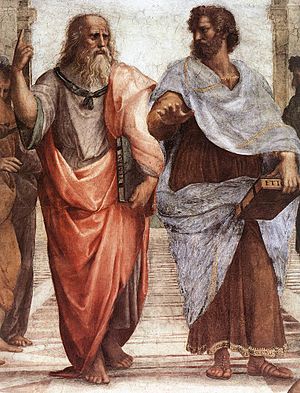Cosmological argument facts for kids

The cosmological argument is an argument for the existence of God. It is also known as the first cause argument for the existence of God. There are three versions of this argument: the argument from causation in esse, the argument from causation in fieri, and the argument from contingency.
St. Thomas Aquinas, the most famous philosopher of the Middle Ages adapted an argument he found in his reading of Aristotle to form one of the earliest, and the most influential versions of the cosmological argument.
The Argument
Framed as a formal proof, the first cause argument can be stated as follows:
- Some things are caused.
- Nothing can cause itself.
- Therefore, everything that is caused is caused by something other than itself.
- A causal chain cannot stretch infinitely backward in time.
- If the causal chain cannot stretch infinitely backward in time, there must be a first cause.
- Therefore, everything that is caused has a first cause, i.e. God.
The cosmological argument infers the existence of God from claims about the entire universe. Fundamentally, the argument is based on the claim that God must exist due to the fact that the universe needs a cause. In other words, the existence of the universe requires an explanation, and an active creation of the universe by a being outside of the universe; generally assumed to be God; is that explanation.
The universe exists, so there must be something that caused the universe. The first cause is claimed to be God. Thomas Aquinas said that God is the only thing that was not caused by something else, and that God created the cause of existence. The idea has been popular with many theologians and philosophers.
A more detailed explanation might go something like this:
Consider some event in the universe. Whatever event you choose, it will be the result of some cause, or more likely a very complex set of causes. Of course each of those causes would be events, which were the result of some other set of causes. Thus, there is is an enormous chain of events in the universe, with the earlier events causing the later events. Now, either this chain of events has a beginning, or it does not.
In light of the Big Bang theory, which asserts that the universe came into existence less than fifteen billion years ago, a stylized version of the basic cosmological argument for the existence of God has emerged:
- Whatever begins to exist has a cause.
- The universe began to exist.
- Therefore, the universe had a cause, i.e. God.
Modern quantum physics is sometimes taken to deny the validity of the first premise of this stylized argument, asserting that subatomic particles such as electrons, positrons, and photons, can come into existence, and perish, by virtue of spontaneous energy fluctuations in a vacuum.
See also
 In Spanish: Argumento cosmológico para niños
In Spanish: Argumento cosmológico para niños

